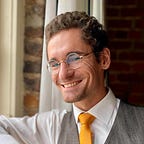Einstein’s Religion
Most people have heard of Albert Einstein’s science. Few people know about his religion.
Einstein’s achievements in physics irreversibly warped our notions of time and space. But the discoveries of Einstein, the physicist, were so monumental that they have largely eclipsed the profound depth of Albert, the man.
Ethically, Albert Einstein might best be described as a Humanist. After he arrived to New York as a refugee from Nazi Germany, he prompted the foundation of the International Rescue Committee, which over 80 years has become one of the largest global relief and humanitarian aide organizations in the world. He expressed a personal affinity for the ethical ideals embodied by Humanist organizations like the New York Society for Ethical Culture. Throughout his life, Einstein was outspoken against nuclear proliferation, war, and racism in various parts of the world. But Einstein’s spiritual feelings went beyond a mere faith in humanity.
Einstein’s religious ideas were complex and often misunderstood. His famous statement, “God does not play dice,” is not an admission of faith. Einstein did not believe in a personal, anthropomorphic God. Though he also wasn’t strictly an atheist.
In his book The World as I See It, Einstein wrote:
The fairest thing we can experience is the mysterious. It is the fundamental emotion which stands at the cradle of true art and true science. He who knows it not and can no longer wonder, no longer feel amazement, is as good as dead … it is this knowledge and this emotion [of the mysterious] that constitute the truly religious attitude; in this sense, and in this alone, I am a deeply religious man.
Skeptical of anthropomorphic and supernatural views of the divine, Einstein nonetheless valued the kernel that lies at the heart of religion. His own spiritual notions didn’t lock horns with science but rather put scientific discovery at the center of spiritual life. Elsewhere in The World as I See It, Einstein even claimed that, “in this materialistic age of ours the serious scientific workers are the only profoundly religious people.”
His views on the cosmos were not supernatural but could be characterized as a type of secular mysticism. He believed there was a rational order to the cosmos. While he didn’t speculate where this order came from, he marveled that it existed and was intelligible to human minds. Einstein understood scientists to be a sort of hierophant: the interpreters of sacred mysteries. He saw scientific pursuit as a process of seeking out and revealing the mysterious architecture of the cosmos. Like most mystical pursuits, scientific inquiry begins with wonder. But while the mystic presses further into his or her own psyche to uncover truths about the inner, human cosmos, the scientist refines the tools of reason to uncover truths about the outer cosmos.
How can we apply Einstein’s vision of a hierophantic science to our own lives? Most of us cannot abandon our careers and become cutting-edge astrophysicists. Neither should we get on our knees and worship scientists nor make pilgrimage to labs as if they were holy sites. The practical spiritual lesson embedded in Einstein’s religious perspective is to revere the order that we find in the universe and find awe in our ignorance.
Human beings value confidence, assurance, sure-footedness. But often, this desire for certainty is a trap. Voltaire said, “To be uncertain is uncomfortable, but to be certain is absurd.” It’s hard to tell if we know anything for certain. Science provides a dangerous sense that we are at, or nearly at, a complete picture of the world. But that may not be true.
As someone at the forefront of his field, Einstein understood better than most how much of the universe still lay in murk and uncertainty. Einstein once gave an object lesson in which he drew a circle on a chalkboard. “As our circle of knowledge expands,” he said, “so does the circumference of darkness surrounding it.”
Yes, the human mind has begun to make sense of the universe. But rather than make the tempting leap to certainty, rather than claim privileged knowledge of how the world “really is,” Einstein urged us to remain awe-struck rather than arrogant. He urged us to stand in amazement of the cosmic gear-work and watch the mysteries do business all around us, to behold the massive dance of light taking place above our heads and delight at the wet ballet of cellular life.
The most honest thing we can do is stand before the doors of reality and admit that we don’t know what lies on the other side. If the history of science has taught us anything, it’s that behind each door we open lies another, heavier door. Though if the history of humanity has taught us anything in turn, it’s that we will always try to pick the lock.
Read more about secular spirituality and listen to the Re-Enchantment podcast at reenchantmentpod.com
